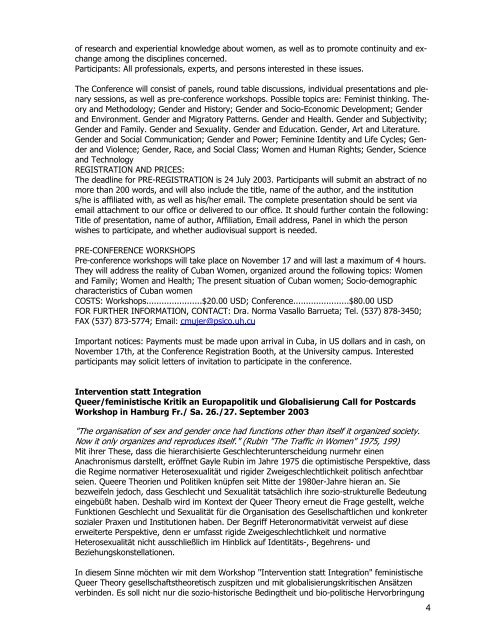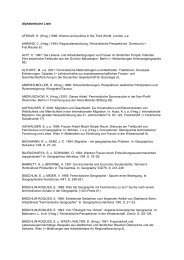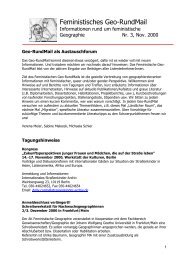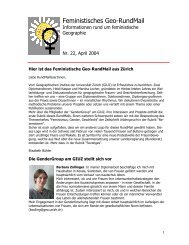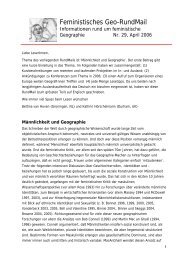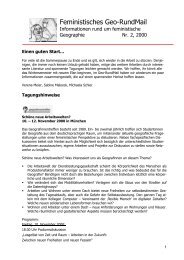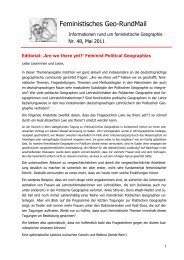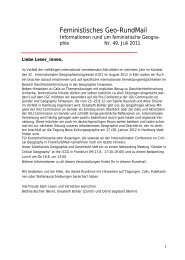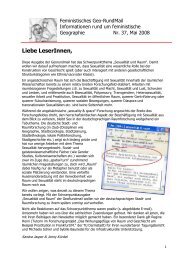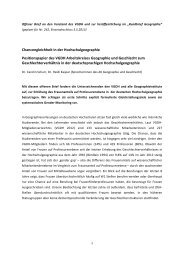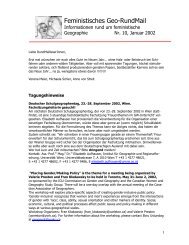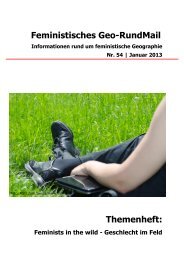Feministisches Geo-RundMail - AK Geographie und Geschlecht
Feministisches Geo-RundMail - AK Geographie und Geschlecht
Feministisches Geo-RundMail - AK Geographie und Geschlecht
Sie wollen auch ein ePaper? Erhöhen Sie die Reichweite Ihrer Titel.
YUMPU macht aus Druck-PDFs automatisch weboptimierte ePaper, die Google liebt.
of research and experiential knowledge about women, as well as to promote continuity and exchange<br />
among the disciplines concerned.<br />
Participants: All professionals, experts, and persons interested in these issues.<br />
The Conference will consist of panels, ro<strong>und</strong> table discussions, individual presentations and plenary<br />
sessions, as well as pre-conference workshops. Possible topics are: Feminist thinking. Theory<br />
and Methodology; Gender and History; Gender and Socio-Economic Development; Gender<br />
and Environment. Gender and Migratory Patterns. Gender and Health. Gender and Subjectivity;<br />
Gender and Family. Gender and Sexuality. Gender and Education. Gender, Art and Literature.<br />
Gender and Social Communication; Gender and Power; Feminine Identity and Life Cycles; Gender<br />
and Violence; Gender, Race, and Social Class; Women and Human Rights; Gender, Science<br />
and Technology<br />
REGISTRATION AND PRICES:<br />
The deadline for PRE-REGISTRATION is 24 July 2003. Participants will submit an abstract of no<br />
more than 200 words, and will also include the title, name of the author, and the institution<br />
s/he is affiliated with, as well as his/her email. The complete presentation should be sent via<br />
email attachment to our office or delivered to our office. It should further contain the following:<br />
Title of presentation, name of author, Affiliation, Email address, Panel in which the person<br />
wishes to participate, and whether audiovisual support is needed.<br />
PRE-CONFERENCE WORKSHOPS<br />
Pre-conference workshops will take place on November 17 and will last a maximum of 4 hours.<br />
They will address the reality of Cuban Women, organized aro<strong>und</strong> the following topics: Women<br />
and Family; Women and Health; The present situation of Cuban women; Socio-demographic<br />
characteristics of Cuban women<br />
COSTS: Workshops......................$20.00 USD; Conference......................$80.00 USD<br />
FOR FURTHER INFORMATION, CONTACT: Dra. Norma Vasallo Barrueta; Tel. (537) 878-3450;<br />
FAX (537) 873-5774; Email: cmujer@psico.uh.cu<br />
Important notices: Payments must be made upon arrival in Cuba, in US dollars and in cash, on<br />
November 17th, at the Conference Registration Booth, at the University campus. Interested<br />
participants may solicit letters of invitation to participate in the conference.<br />
Intervention statt Integration<br />
Queer/feministische Kritik an Europapolitik <strong>und</strong> Globalisierung Call for Postcards<br />
Workshop in Hamburg Fr./ Sa. 26./27. September 2003<br />
"The organisation of sex and gender once had functions other than itself it organized society.<br />
Now it only organizes and reproduces itself." (Rubin "The Traffic in Women" 1975, 199)<br />
Mit ihrer These, dass die hierarchisierte <strong>Geschlecht</strong>erunterscheidung nurmehr einen<br />
Anachronismus darstellt, eröffnet Gayle Rubin im Jahre 1975 die optimistische Perspektive, dass<br />
die Regime normativer Heterosexualität <strong>und</strong> rigider Zweigeschlechtlichkeit politisch anfechtbar<br />
seien. Queere Theorien <strong>und</strong> Politiken knüpfen seit Mitte der 1980er-Jahre hieran an. Sie<br />
bezweifeln jedoch, dass <strong>Geschlecht</strong> <strong>und</strong> Sexualität tatsächlich ihre sozio-strukturelle Bedeutung<br />
eingebüßt haben. Deshalb wird im Kontext der Queer Theory erneut die Frage gestellt, welche<br />
Funktionen <strong>Geschlecht</strong> <strong>und</strong> Sexualität für die Organisation des Gesellschaftlichen <strong>und</strong> konkreter<br />
sozialer Praxen <strong>und</strong> Institutionen haben. Der Begriff Heteronormativität verweist auf diese<br />
erweiterte Perspektive, denn er umfasst rigide Zweigeschlechtlichkeit <strong>und</strong> normative<br />
Heterosexualität nicht ausschließlich im Hinblick auf Identitäts-, Begehrens- <strong>und</strong><br />
Beziehungskonstellationen.<br />
In diesem Sinne möchten wir mit dem Workshop "Intervention statt Integration" feministische<br />
Queer Theory gesellschaftstheoretisch zuspitzen <strong>und</strong> mit globalisierungskritischen Ansätzen<br />
verbinden. Es soll nicht nur die sozio-historische Bedingtheit <strong>und</strong> bio-politische Hervorbringung<br />
4


